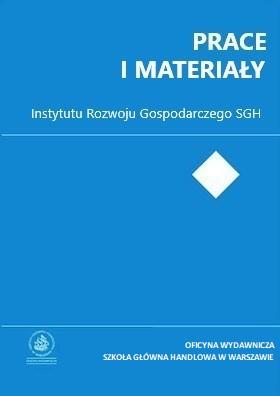Political Business Cycle in Crisis Time
Main Article Content
Abstract
In an attempt to address the question concerning sources of the financial crisis that started in the United States at the turn of 2007 and the current European debt crisis, the author indicates the significance of political activity in the context of potential factors triggering the crisis as well as the ones contributing to public finance situation. Referring to the classic theories of political business cycle, the author presents arguments that might prove that the right-wing politicians under some circumstances contribute to mounting indebtedness of the state. This thesis is not commonly known and approved. The author also tries to answer the question why governments in view of a crisis are reluctant to launch indispensable reforms. Finally, he discusses the extent to which political choices affect indebted economies. This discussion focuses on the concealed question to what extent democratic system brings about indebtedness to the state. (original abstract)
Article Details
References
Alesina A., Fiscal Adjustment: Lessons from Recent History, Harvard University, 2010 – prepared for The Ecofin Meeting in Madrid – April 15, 2010.
Alesina A., Perotti R., Tavares J., The Political Economy of Fiscal Adjustments, Brookings Papers on Economic Activity, 1998.
Beck T., Clarke G., Groff A., Keefer P. and Walsh P., New Tools in Comparative Political Economy: The Database of Political Institutions, “World Bank Economic Review” 2001, Vol. 15.
Brender A., Drazen A., Political Budget Cycles in New Versus Established Democracies, “Journal of Monetary Economics” 2005, Vol. 52.
Brender A., Drazen A., Political Budget Cycles in New, Old and Established Democracies, Comparative Economic Studies, 2007.
Broz J., Partisan L., Financial Cycles, Department of Political Science, University of California, 2010.
Calmfors L., Comment on Charles Wyplosz: Fiscal Policy Counsils – Unlovable or Just Unloved?,” Swedish Economic Policy Review” 2008, Vol. 15.
Calmfors L., The Role of Independent Fiscal Policy Institutions, CESifo, “Working Paper” 2011, No. 3367.
Cameron D., Does Government Cause Inflation? Taxes, Spending and Deficits, w: The Politics of Inflation and Economic Stagnation, L. Lindberg, Maier Ch., Brookings Institution, Washington 1985.
Chinn M. D., Frieden J., Reflections on The Causes and Consequences of The Debt Crisis of 2008, “La Follette Policy Report” 2009, No. 19.
Hagen von J., The Scope of Limits of Fiscal Counsils, Paper to Conference on Independent Fiscal Institutions, Fiscal Council Republic of Hungary, Budapest,18- 19 March 2010.
Hibbs D., Political Parties and Macroeconomic Policy, “American Political Science Review” 1977, Vol. 71.
Kirsanova T., Campbell L., Wren-Lewis S., Optimal Debt Policy and aan Institutional Proposal to Help in Its Implementation, w: J. Ayuso-i-Casals, S. Deroose, E.
Flores, L. Moulin, The Role of Fiscal Rules and Institutions in Shaping Budgetary Outcomes, “European Economy - Economic Papers”, 2007, No. 275.
Kopits G., Romhanyi B., Lessons from Hungary, Paper to Conference on Independent Fiscal Institutions, Fiscal Council Republic of Hungary, Budapest,18-19 March 2010.
Nordhaus W. D., The Political Business Cycle, “Review of Economic Studies” 1975, Vol. 42.
Ohlsson H., Vedrin A., Political Cycles and Cyclical Policies, “Scandinavian Journal of Economics” 1996, Vol. 98.
Reinhart M.C., Rogoff K.S., Is The 2007 U.S. Subprime Crisis So Different? An international Historical Comparison, “American Economic Review” 2008, Vol. 98.
Reinhart M.C., Rogoff K.S., This Time is Different: Eight Centuries of Financial Folly, Princeton University Press, 2009.
Stolarczyk P., Wojtas W., Sankcje muszą być automatyczne, „Rzeczpospolita” 2012, 20 stycznia, s. B9.
Wren-Lewis S., Comparing The Delegation of Monetary and Fiscal Policy, Paper to Conference on Independent Fiscal Institutions, Fiscal Council Republic of Hungary, Budapest, 18-19 March 2010.
Wren-Lewis S., Fiscal Policy, Inflation and Stabilization in EMU, Graduate Institute for International Studies, Geneva 2002.
